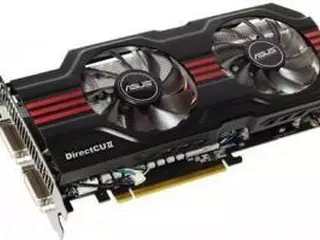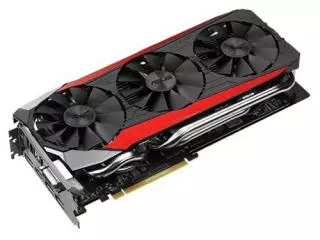GeForce GTX 560 Ti vs Radeon R9 Fury
Find out if it is worth upgrading your current GPU setup by comparing GeForce GTX 560 Ti and Radeon R9 Fury. Here you can take a closer look at graphics cards specs, such as core clock speed, memory type and size, display connectors, etc. The price, overall benchmark and gaming performances are usually defining factors when it comes to choosing between GeForce GTX 560 Ti and Radeon R9 Fury. Make sure that the graphics card has compatible dimensions and will properly fit in your new or current computer case. Also these graphics cards may have different system power recommendations, so take that into consideration and upgrade your PSU if necessary.
Main Specs
GeForce GTX 560 Ti
Radeon R9 Fury
Power consumption (TDP)
170 Watt
275 Watt
Interface
PCIe 2.0 x16
PCIe 3.0 x16
Supplementary power connectors
2x 6-pin
Memory type
GDDR5
High Bandwidth Memory (HBM)
Maximum RAM amount
1 GB
4 GB
Display Connectors
2x DVI, 1x mini-HDMI
1x HDMI, 3x DisplayPort
Check Price
Check Price
Radeon R9 Fury has 61% more power consumption, than GeForce GTX 560 Ti.
GeForce GTX 560 Ti is connected by PCIe 2.0 x16, and Radeon R9 Fury uses PCIe 3.0 x16 interface.
Radeon R9 Fury has 3 GB more memory, than GeForce GTX 560 Ti.
Both cards are used in Desktops.
GeForce GTX 560 Ti is build with Fermi architecture, and Radeon R9 Fury - with GCN 1.2.
GeForce GTX 560 Ti is manufactured by 40 nm process technology, and Radeon R9 Fury - by 28 nm process technology.
Memory clock speed of GeForce GTX 560 Ti is 1504 MHz higher, than Radeon R9 Fury.
Game benchmarks
Assassin's Creed Odyssey
Battlefield 5
Call of Duty: Warzone
Counter-Strike: Global Offensive
Cyberpunk 2077
Dota 2
Far Cry 5
Fortnite
Forza Horizon 4
Grand Theft Auto V
Metro Exodus
Minecraft
PLAYERUNKNOWN'S BATTLEGROUNDS
Red Dead Redemption 2
The Witcher 3: Wild Hunt
World of Tanks
high / 1080p
16−18
50−55
ultra / 1080p
9−10
30−35
QHD / 1440p
4−5
27−30
4K / 2160p
−
14−16
low / 720p
30−35
75−80
medium / 1080p
18−20
60−65
The average gaming FPS of Radeon R9 Fury in Assassin's Creed Odyssey is 212% more, than GeForce GTX 560 Ti.
high / 1080p
24−27
75−80
ultra / 1080p
21−24
70−75
QHD / 1440p
8−9
55−60
4K / 2160p
6−7
27−30
low / 720p
50−55
130−140
medium / 1080p
27−30
85−90
The average gaming FPS of Radeon R9 Fury in Battlefield 5 is 216% more, than GeForce GTX 560 Ti.
low / 768p
45−50
45−50
QHD / 1440p
0−1
−
GeForce GTX 560 Ti and Radeon R9 Fury have the same average FPS in Call of Duty: Warzone.
low / 768p
210−220
250−260
medium / 768p
180−190
230−240
ultra / 1080p
100−110
−
QHD / 1440p
50−55
150−160
4K / 2160p
30−35
100−110
high / 768p
140−150
220−230
The average gaming FPS of Radeon R9 Fury in Counter-Strike: Global Offensive is 54% more, than GeForce GTX 560 Ti.
low / 768p
55−60
70−75
ultra / 1080p
40−45
−
medium / 1080p
45−50
50−55
The average gaming FPS of Radeon R9 Fury in Cyberpunk 2077 is 19% more, than GeForce GTX 560 Ti.
low / 768p
110−120
120−130
medium / 768p
95−100
110−120
ultra / 1080p
65−70
110−120
The average gaming FPS of Radeon R9 Fury in Dota 2 is 26% more, than GeForce GTX 560 Ti.
high / 1080p
18−20
65−70
ultra / 1080p
16−18
60−65
QHD / 1440p
16−18
40−45
4K / 2160p
6−7
21−24
low / 720p
40−45
100−110
medium / 1080p
20−22
65−70
The average gaming FPS of Radeon R9 Fury in Far Cry 5 is 205% more, than GeForce GTX 560 Ti.
high / 1080p
24−27
90−95
ultra / 1080p
20−22
70−75
QHD / 1440p
16−18
45−50
4K / 2160p
−
21−24
low / 720p
100−110
220−230
medium / 1080p
55−60
140−150
The average gaming FPS of Radeon R9 Fury in Fortnite is 157% more, than GeForce GTX 560 Ti.
high / 1080p
27−30
85−90
ultra / 1080p
21−24
65−70
QHD / 1440p
9−10
50−55
4K / 2160p
9−10
30−35
low / 720p
55−60
130−140
medium / 1080p
30−33
90−95
The average gaming FPS of Radeon R9 Fury in Forza Horizon 4 is 196% more, than GeForce GTX 560 Ti.
low / 768p
85−90
160−170
medium / 768p
75−80
150−160
high / 1080p
30−35
95−100
ultra / 1080p
12−14
45−50
QHD / 1440p
3−4
40−45
The average gaming FPS of Radeon R9 Fury in Grand Theft Auto V is 140% more, than GeForce GTX 560 Ti.
high / 1080p
10−11
35−40
ultra / 1080p
8−9
30−35
QHD / 1440p
−
24−27
4K / 2160p
3−4
14−16
low / 720p
30−35
95−100
medium / 1080p
12−14
50−55
The average gaming FPS of Radeon R9 Fury in Metro Exodus is 261% more, than GeForce GTX 560 Ti.
low / 768p
110−120
120−130
medium / 1080p
100−110
−
The average gaming FPS of Radeon R9 Fury in Minecraft is 8% more, than GeForce GTX 560 Ti.
high / 1080p
21−24
75−80
ultra / 1080p
18−20
55−60
4K / 2160p
−
18−20
low / 720p
55−60
120−130
medium / 1080p
24−27
85−90
The average gaming FPS of Radeon R9 Fury in PLAYERUNKNOWN'S BATTLEGROUNDS is 177% more, than GeForce GTX 560 Ti.
high / 1080p
14−16
35−40
ultra / 1080p
10−11
24−27
QHD / 1440p
0−1
16−18
4K / 2160p
−
10−12
low / 720p
30−33
95−100
medium / 1080p
16−18
55−60
The average gaming FPS of Radeon R9 Fury in Red Dead Redemption 2 is 200% more, than GeForce GTX 560 Ti.
low / 768p
55−60
180−190
medium / 768p
35−40
120−130
high / 1080p
20−22
70−75
ultra / 1080p
10−12
40−45
4K / 2160p
8−9
24−27
The average gaming FPS of Radeon R9 Fury in The Witcher 3: Wild Hunt is 233% more, than GeForce GTX 560 Ti.
low / 768p
100−110
120−130
medium / 768p
60−65
−
ultra / 1080p
35−40
65−70
high / 768p
55−60
−
The average gaming FPS of Radeon R9 Fury in World of Tanks is 35% more, than GeForce GTX 560 Ti.
Full Specs
GeForce GTX 560 Ti
Radeon R9 Fury
Architecture
Fermi
GCN 1.2
Code name
GF114
Fiji
Type
Desktop
Desktop
Release date
25 January 2011
16 June 2015
Pipelines
384
3584
Core clock speed
822 MHz
Boost Clock
1000 MHz
Transistor count
1,950 million
8,900 million
Manufacturing process technology
40 nm
28 nm
Texture fill rate
52.67
224.0
Floating-point performance
1,263.4 gflops
7,168 gflops
Length
229 mm
Memory bus width
256 Bit
4096 Bit
Memory clock speed
2004 MHz
500 MHz
Memory bandwidth
128.3 GB/s
512 GB/s
Shared memory
-
DirectX
12 (11_0)
Shader Model
5.1
6.3
OpenGL
4.6
4.5
OpenCL
1.1
2.0
Vulkan
N/A
+
CUDA
2.1
FreeSync
+
Bus support
PCIe 3.0
HDMI
+
Bitcoin / BTC (SHA256)
87 Mh/s
800 Mh/s
Eyefinity
+
HD3D
+
PowerTune
+
TrueAudio
+
Mantle
+
Bridgeless CrossFire
+
Number of Eyefinity displays
6
DisplayPort support
+
CrossFire
+
VCE
+
DDMA audio
+
Decred / DCR (Decred)
0.39 Gh/s
Compute units
56
AppAcceleration
+
High bandwidth memory (HBM)
+
LiquidVR
+
TressFX
+
UVD
+
FRTC
+
Check Price
Check Price

